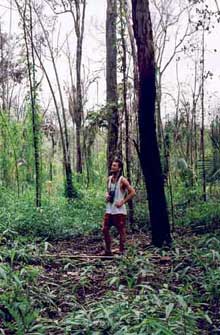Amazon wildfires contribute to carbon problem

Amazon rainforest burnt three timesand pictured after 4 years with Dr Barlow pictured
More trees are dying following forest fires in the Amazon than was previously thought, according to new research from the University of East Anglia (UEA).
Trees that initially appear to survive fires, such as those caused by El Niño, are in fact dying two to three years later, increasing carbon emissions and causing further loss of Amazonian vegetation.
Dr Barlow of UEA’s School of Environmental Sciences found that many of the large, thicker-barked trees that survive up to two years following ground fires had died after three years, dramatically reducing the amount of carbon stored in living trees.
“Three years after the fires the amount of viable tree-life is less than half of that found in unburned areas of forest,” said Dr Barlow.
“These wildfires make substantial contributions to atmospheric carbon dioxide, a fact that will take on further significance as El Niño events threaten to become increasingly frequent and severe,” he continued.
The research is published this month in the journal Ecology Letters.
Media Contact
All latest news from the category: Ecology, The Environment and Conservation
This complex theme deals primarily with interactions between organisms and the environmental factors that impact them, but to a greater extent between individual inanimate environmental factors.
innovations-report offers informative reports and articles on topics such as climate protection, landscape conservation, ecological systems, wildlife and nature parks and ecosystem efficiency and balance.
Newest articles

After 25 years, researchers uncover genetic cause of rare neurological disease
Some families call it a trial of faith. Others just call it a curse. The progressive neurological disease known as spinocerebellar ataxia 4 (SCA4) is a rare condition, but its…

Lower dose of mpox vaccine is safe
… and generates six-week antibody response equivalent to standard regimen. Study highlights need for defined markers of mpox immunity to inform public health use. A dose-sparing intradermal mpox vaccination regimen…

Efficient, sustainable and cost-effective hybrid energy storage system for modern power grids
EU project HyFlow: Over three years of research, the consortium of the EU project HyFlow has successfully developed a highly efficient, sustainable, and cost-effective hybrid energy storage system (HESS) that…





















